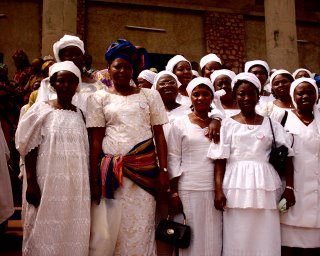Kayoma Women’s Development Association Support Group

Since the end of the civil war in Sierra Leone there are many war widows, traumatized young women and school leavers with children who have no source of income and because of their experiences as combatants or war victims they have had little opportunity to acquire education or skills to become self-supporting.
The Kayoma Women’s Development Group was formed by Teresa Bangali to support these women, by production of marketable goods which would provide income, empower them by skills training and creative activity, such as tie dyeing of gara cloth, needlework, backyard gardening and also weaving, a skill previously only undertaken by men.
The group includes also professional women, mainly teachers, who provide financial support and work with the disadvantaged members.
Last Autumn (2003) Maria Franchi from Warwick One World Link visited Bo (Sierra Leone, Africa) and was very impressed by the enthusiasm and potential of Kayoma. She brought with her the idea that a microcredit scheme might be a practical way in which to finance such groups. She and Teresa went to DFID in Freetown to discuss the idea. They were put in touch with Mr John Bosco Musa of the Manjama Institute of Agriculture (M.I.A.) who is in Bo, and is already running a microcredit scheme.
As a result of this contact Kayoma has become the umbrella group for eight women’s groups in the Bo area who have joined the microcredit scheme with an average of thirty women in each group.
Microcredit Scheme as a tool for empowerment and development
Only women’s groups registered with Bo One World Link and the Department of Social Welfare will qualify to join the Scheme. There are strict regulations regarding registration, allocation of loans, criteria for lending and responsibility for repayments or, in the case of default, suspension of the scheme until the situation is rectified.
These first loans have purchased essential trading commodities, or the materials to make them. At the end of the six month period in July this should ensure that the loans and interest and administrative costs will have been repaid, leaving a surplus. Decisions will then be made about the use of further loans, with the aim of developing training courses and educational projects as money becomes available.
Already training sessions have been held to teach the basics of small trading – making a business plan, costing and accounting – this gives members the confidence and knowledge to avoid being cheated by wholesale traders or sharp customers. After attending training sessions led by Maria Franchi some of the women are now training others in business skills. They expect in time to take over the administration of the micro-credit scheme for which further training (and therefore funds) will be needed.
A positive picture is emerging
A positive picture is emerging. The members stress the importance of their group in providing training in marketable skills, but just as important to them is the support network of friends, and the importance of working together for their mutual benefit. Those who have had little formal education realize that they can learn new skills and develop old ones, thus becoming financially independent, empowered to control their own lives, and of great value to their community.
A typical group meeting, usually on a Saturday, when working members can come, may attract upto 40 women. There are social occasions as well as working days, and all the members benefit from the support network of the group. Particular tensions arise with the integration of former rebel combatants into the groups, many of whose participants are themselves the victims of the atrocities. Abductions, forced shootings and mutilations were committed by the rebel forces, usually under the influence of injected drugs. And now the groups are faced with the need to include women and young girls who have been implicated in these activities.
Genuine remorse and apology helps, and the recognition that the rebel recruits were themselves often abducted, raped and drugged into submission. Forgiveness is never easy, but the women recognize that without forgiveness they will never be able to move forward.
Leaders of both Christian and Muslims faiths have been working closely together to establish peace, teaching in each others places of worship, and enabling people to worship in each others traditional places and share religious ceremonies. They teach that to achieve a stable and long-lasting peace, perpetrators and victims will have to work together and learn to forgive in order to rebuild community and reconstruct society.
The emphasis has been especially in the schools, where teachers of all faiths have united to spread the message “We must forgive when people are really sorry for what they have done” and the children are taking this message home to their families.
In the women’s groups this difficult process is made a little easier by the practical experience of working together, learning together and sharing skills as well as experiences. The sharing of life stories, both the good and the awful parts, has been valuable in releasing the anger and fear and in affirming the common humanity of women.
"We believe this shows how a relatively small investment in the women, with their enthusiasm, courage, and determination to rebuild their lives, will pay enormous dividends in creating a more self confident and stable community in this part of Sierra Leone. We also believe that this initiative will be likely to have influence beyond the immediate area and indeed into many parts of West Africa where such ideas are still in their infancy".
Teresa Bangali and Myf Hodkin

0 Comments:
Post a Comment
<< Home